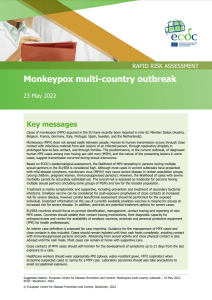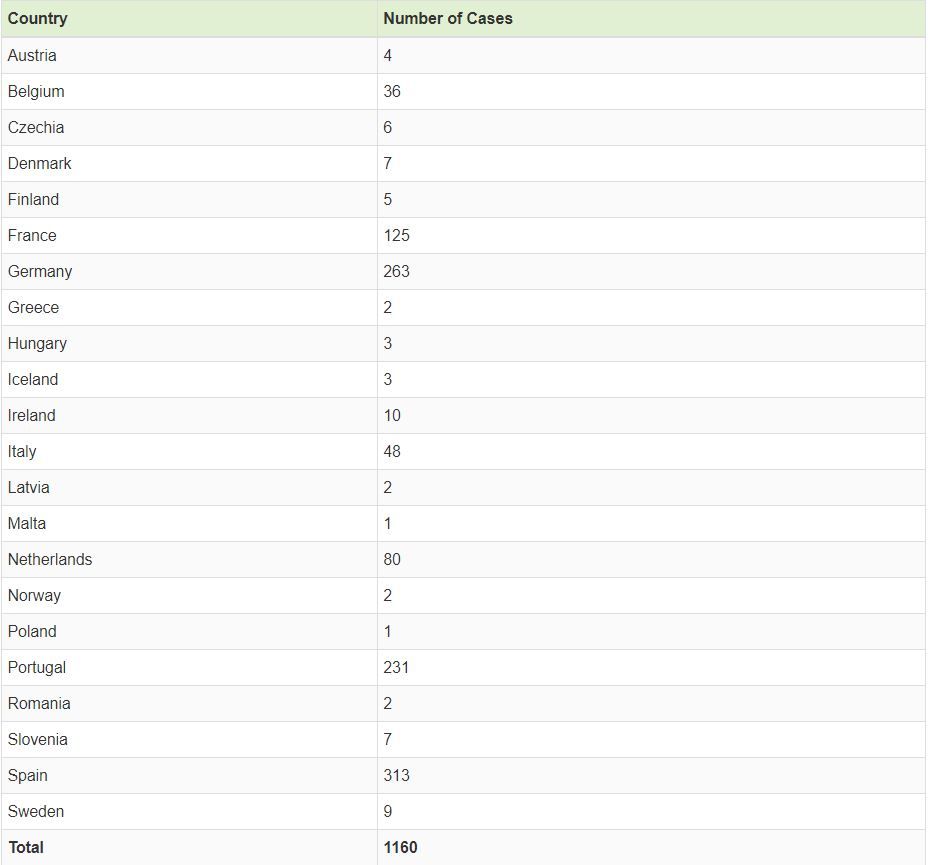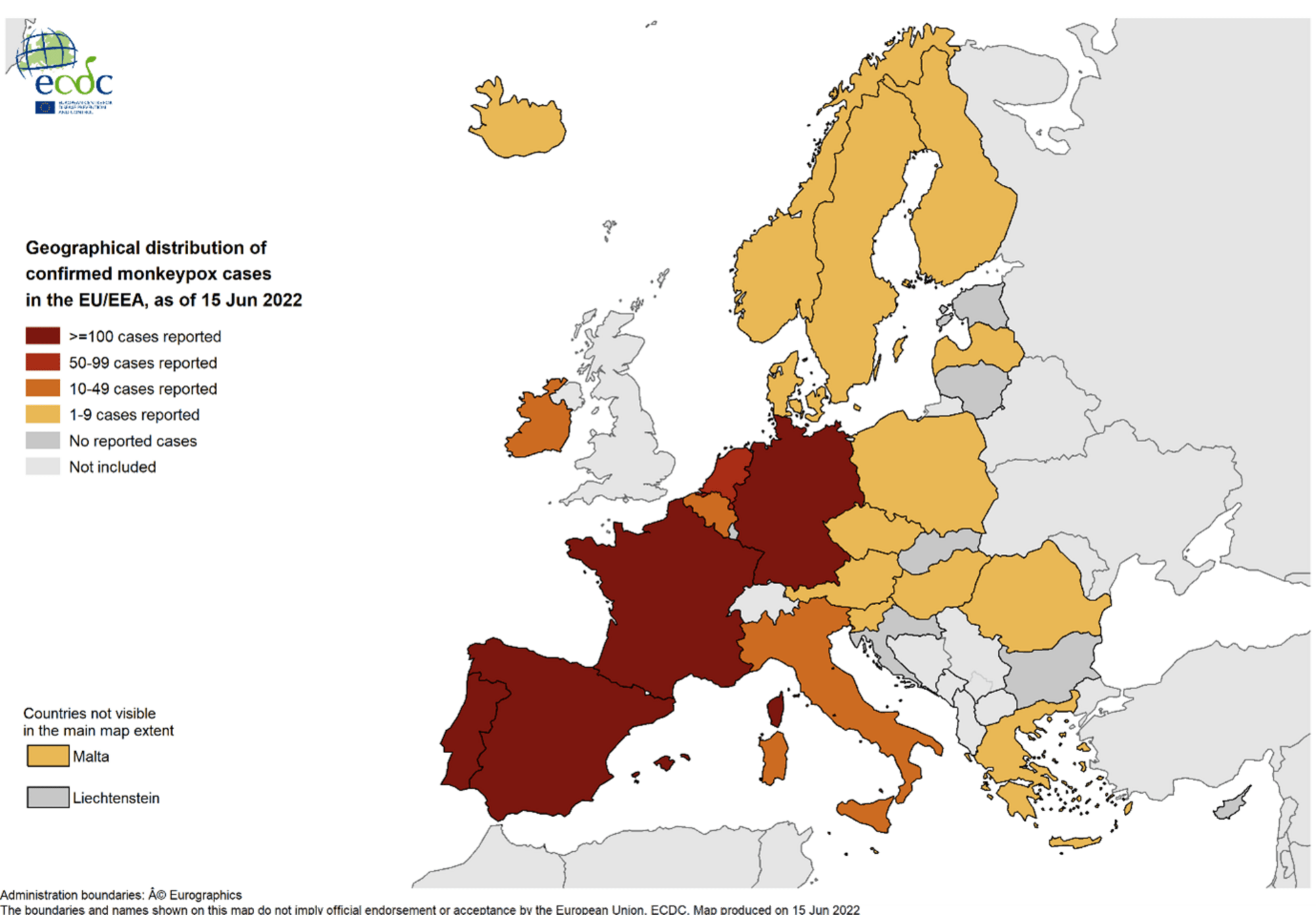Monkeypox (MPX) is a zoonotic disease and is currently the most prevalent orthopoxviral infection in humans after the eradication of smallpox and the cessation of universal smallpox vaccination. In endemic areas, monkeypox virus (MPXV) probably circulates among a number of mammals, although there is no known reservoir. Occasional spill-over events to humans generate outbreaks. MPXV is transmitted to humans through bite or direct contact with an infected animal’s blood, meat, bodily fluids, or cutaneous/mucosal lesions.
This report presents an update of MPX confirmed cases in the European Union/European Economic Area (EU/EEA) and worldwide. Cases detected in the EU/EEA have been reported according to the ECDC case definition and are obtained through screening of official websites. Cases reported from outside the EU/EEA are collected through screening of official websites and media sources.
A table with the latest update of confirmed cases is shown below:
| Joint ECDC-WHO Regional Office for Europe Mpox Surveillance Bulletin | ||||
| Country/Area | Number of new cases identified through IHR, official public sources and TESSy in the past 4 ISO weeks | Cumulative number of cases identified through IHR, official public sources and TESSy | Cumulative number of cases reported through TESSy | |
| Spain | 72 | 7408 | 7408 | |
| France | 13 | 4110 | 4110 | |
| United Kingdom | 29 | 3730 | 3678 | |
| Germany | 5 | 3673 | 3673 | |
| Netherlands | 14 | 1251 | 1251 | |
| Portugal | 4 | 948 | 942 | |
| Italy | 25 | 923 | 923 | |
| Belgium | 5 | 790 | 790 | |
| Switzerland | 5 | 551 | 551 | |
| Austria | 2 | 327 | 327 | |
| Israel | 0 | 262 | 230 | |
| Sweden | 24 | 236 | 236 | |
| Ireland | 16 | 223 | 223 | |
| Poland | 4 | 214 | 214 | |
| Denmark | 0 | 191 | 191 | |
| Norway | 0 | 93 | 93 | |
| Greece | 1 | 85 | 85 | |
| Hungary | 0 | 80 | 80 | |
| Czechia | 1 | 71 | 71 | |
| Luxembourg | 2 | 57 | 57 | |
| Slovenia | 0 | 47 | 47 | |
| Romania | 3 | 46 | 46 | |
| Finland | 0 | 42 | 42 | |
| Serbia | 0 | 40 | 40 | |
| Malta | 0 | 33 | 33 | |
| Croatia | 0 | 29 | 29 | |
| Iceland | 0 | 16 | 16 | |
| Slovakia | 0 | 14 | 14 | |
| Türkiye | 0 | 12 | 12 | |
| Estonia | 0 | 11 | 11 | |
| Bosnia and Herzegovina | 0 | 9 | 9 | |
| Gibraltar | 0 | 6 | 5 | |
| Bulgaria | 0 | 6 | 6 | |
| Latvia | 0 | 6 | 6 | |
| Cyprus | 0 | 5 | 5 | |
| Lithuania | 0 | 5 | 5 | |
| Ukraine | 0 | 5 | 5 | |
| Andorra | 0 | 4 | 4 | |
| Monaco | 0 | 3 | 0 | |
| Georgia | 0 | 2 | 2 | |
| Russian Federation | 0 | 2 | 0 | |
| Montenegro | 0 | 2 | 0 | |
| Republic of Moldova | 0 | 2 | 2 | |
| Greenland | 0 | 2 | 0 | |
| San Marino | 0 | 1 | 1 | |
| Total | 225 | 25573 | 25473 | |
Geographical distribution of confirmed PMX cases in EU/EEA countries
The countries with the highest number of infections are the Spain, France, UK and Germany.
More information
Monkeypox Surveillance Bulletin
16/06/22
As of 15 June, a total of 1 160 confirmed cases of monkeypox have been reported from 22 EU/EEA countries. Most cases have been found in young men, and where sexual orientation is known, almost all patients are men who have sex with men. There have been no deaths. The clinical presentation is generally described to be mild, with most cases presenting with lesions on the genitalia or peri-genital area, indicating that transmission likely occurred by close physical contact during sexual activities.
Number of confirmed cases by country, EU/EEA, as of 15 June 2022
Geographical distribution of confirmed cases of MPX in EU/EEA countries, as of 15 June 2022
Worldwide update
As of 15 June 2022, 724 confirmed cases of monkeypox have been reported from 13 non-EU/EEA countries: United Kingdom (470), Canada (112), United States (72), Switzerland (20), Australia (13), United Arab Emirates (13), Argentina (5), Ghana (5), Mexico (5), Israel (4), Brazil (3), Morocco (1) and Venezuela (1).

Risk assessment: Monkeypox multi-country outbreak |
Source: European Centre for Disease Prevention and Control – News










Leave a Reply